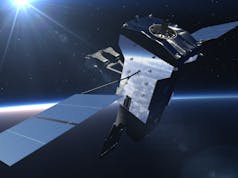The UK Space Agency has released a new report outlining 11 crucial technology areas poised to propel the nation further into space.
This “Space Exploration Technology Roadmap” will steer R&D activities and forthcoming funding decisions for the next ten years, aiming to fortify the UK’s position in the growing global space economy.
According to the roadmap, it seeks to address certain gaps while leveraging existing strengths. The objective is to optimally benefit from the burgeoning commercialisation of space exploration. Forecasts predict the global space economy to be worth a staggering $1 trillion by 2040.
“Discovery is fundamental to the work of the UK Space Agency, and we are entering a new era of space exploration where governments and commercial operators are working closer than ever before,” remarked UK Space Agency CEO Dr Paul Bate in a press release.
He further stated, “By setting out this roadmap, we are giving clarity to industry and researchers across the space sector, and positioning the UK as a partner of choice for future space exploration missions to the Moon, Mars and beyond.”
Notably, the roadmap underscores the value of Autonomy and Artificial Intelligence (AI) for future missions. When venturing far from Earth, autonomous navigation becomes pivotal, reducing reliance on continuous human control. Furthermore, as mankind revisits the Moon and envisions Mars expeditions, space nuclear power emerges as a sustainable energy source, critical for diverse activities like construction and life support.
The pivotal technologies spotlighted in the roadmap encompass:
- Advanced Manufacturing
- Autonomy & Artificial Intelligence
- Communications & Mission Operations
- In Situ Resource Utilisation
- Life Support & Crew Performance
- Navigation & Sensing
- Propulsion
- Robotics
- Sample Curation
- Science Instrumentation
- Space Nuclear Power
Built upon consultations with the space sector, the roadmap mirrors the goals of the National Space Strategy. It intends to propel the UK to the pinnacle of innovative research and development.
The roadmap’s unveiling follows the inaugural assembly of the revived National Space Council. Discussions therein revolved around the UK’s aspirations, including spearheading Europe’s small commercial launch sector by 2030. Also revealed was the “National Space Strategy in Action,” detailing progress since the National Space Strategy’s 2021 introduction and strategies to foster regional space clusters and enhance space regulations.
Highlighted projects within the roadmap include the Lunar Pathfinder, an innovative endeavour by Surrey Satellite Technology and the UK-led Rosalind Franklin Rover set for a 2028 Mars launch. Other noteworthy mentions are Nammo’s satellite propulsion system and the University of Glasgow’s pioneering pulse elevator technology.



















It is to this country’s utmost shame, that our useless politicians, gave all our rocket technology to the ESA, and gave zero encouragement to our own efforts. David Willetts, in giving £50 million to Reaction Engines was the exception. All honour to the private sector in building a world beating satellite industry. I loathe the political class.
Yes and those that ‘gave away’ ARM who should hang their heads in shame as all its patents were quickly sold cheap to China.
Our politicians are clueless about tech.
I also notice UK productivity took a plunge when I retired! No joking but since then productivity per person has flatlined. Whats wrong?
A small observation, if I may. Much of our productivity is reliant upon ranks of people sitting behind paperwork-oriented computer systems that generate numerous ether-reports, but little by way of substance *. And that only after you’ve spent many hours trying to get the thing to a) function, b) believe you’re who you say you are following excruciating numbers of ‘security checks’ – which prevent your work, but evidently not hostiles from stealing it, we’re told. Just a little more manufacturing, where computers demonstrate their major productivity forte, could well prove extremely positive for the UK. Yes * that was… Read more »
I completely agree with this statement. I keep saying at my aerospace company, spreadsheets and meetings do not fly planes , engineers building does .
A small cathartic pushback.
I think we’re focussing our efforts on HS2.
This is good. Another report, always needed of course. Meanwhile India has put a rover on the moon. Puts things into perspective I think.🚀
Hear hear, it sure shows how far behind the curve Britain is!!